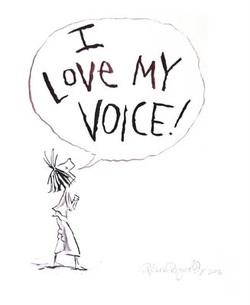 February 2014 We did it ! The boxes are not unpacked exactly, but they are inside our new location. We are super excited about this move and the new opportunities it will give us to service the Huntsville and Madison area. Inside this month's E-Newsletter you will find; * A great article about the human voice. * Meet our Teacher of the Month Maria Okoye * Meet our Student of the Month Sydney Caudil  "Taking Care of Your Voice" Whether you're a singer taking voice lessons or someone who sings in church or in the car for fun, when you open your mouth to sing, you want your voice to sound its best. Here are some recommendations that will help your voice to perform to the best of its ability. P + B + S= Good Singing First of all, check your posture. You should be sitting or standing with a straight spine, shoulders slightly back, chest and ribcage open, and your chin level to the ground. If your posture isn't right, you can have tension in your voice and a lack of breath support. Your breath should always come from the belly, not the chest. When you inhale to breathe before singing, expand your belly to let your lungs fill up. If you take a deep breath and your shoulders rise, you're not doing it correctly. Try lying down on your back and putting a book on your belly to practice deep belly breaths. You will learn more breathing exercises if you decide to take voice lessons. The space of your mouth should be open and vertical, like you have an egg resting on your tongue. The vowel shapes you make when you sing greatly affect the way your voice sounds. Vertical vowels make a more mature, bigger sound. Vocal Problems If you have problems with your voice like a raspy sound or cracking, you may want to try a changing some things in your diet and medication. First of all, you should always drink plenty of water to keep the voice hydrated. If you're drinking 8 glasses of water a day and still having raspy sounds or cracking, try not eating dairy products before you sing. Dairy can cause excess mucus in the voice. Chocolate can also cause cracking in the voice if consumed right before singing. Caffeine can affect some people's voices more than others. Try eliminating sodas and coffee to see if it helps your voice. Do you take medication for allergies? If so, and you're still having trouble with raspy sounds or cracking in your voice, your allergy medication could be drying out your voice. Ask your doctor if you would like to try an allergy medication that is non-drying to the voice. Cold medications such as Sudafed or Dayquil can also dry out the voice. Another main reason people get a raspy quality or cracking in the voice is acid reflux. Do you have symptoms of acid reflux, such as an acid taste in the back of the throat or heartburn? You may also want to talk to your doctor about acid reflux if you continue to have vocal problems that are not going away. Practice Time When you are practicing for your voice lessons, please be careful not to strain your voice. In order to not strain and have best results, always warm up your voice with the warm-ups your teacher has taught you. If you feel discomfort in your voice at any time during practice, stop and come back to it later on another day. Generally, young students should practice from 15-30 minutes a day. Adults and teenagers can practice from 30-60 minutes a day, depending upon vocal health. If there are any vocal problems such a sore throat, vocal strain, or hoarseness, do not practice until it goes away. Written By: Vanessa Miller Mantis  Student of the Month: Sydney Caudil 1. What instruments do you play? Voice, Guitar, and Bass 2. How long have you taken lessons? 8 years 3. What are your other hobbies, besides music? I Cheer of JC 4. What is the coolest thing you've learned in your lessons in the past three months? How to Expand My Vocal Range 5. Favorite Food? Egg Rolls 6. Do you have any performances coming up? Whenever the "Musicology Rock Band" plays again.  Teacher of the Month: Maria Okoye 1. What do you like most about teaching? I like the results of teaching. I am happy when a student has learned to play or sing a new song. Making music is a very productive way for students to spend their leisure time. I know that I am helping students develop musical skills that they can use in their leisure time for the rest of their lives. 2. How do you try to inspire students to practice more? I try to find and assign music that each student enjoys. Also, I have found that most of my students want to imitate me once they hear me play or sing their assigned music. I often remind myself that practicing is a skill that students should learn from a teacher. I help students work through passages by encouraging them to "talk out loud" with me while executing the musical passages. We repeat this process a number of times, until the thought process is internalized and the passage can be played without mistakes. 3. How does playing and practicing music impact a child's life? Practicing correctly takes a lot of discipline. A child usually works in solitude, daily reviewing sections of music over and over again. Sometimes it doesn't seem like fun. Once a piece of music has been learned, children should be encouraged to take pride in their work. Even learning music that is relatively simple fosters a sense of accomplishment. One of my teen students, a beginner, is so excited about being able to play the piano for her friends. She told me that her friends think that it is so cool. Her friends are not concerned that the songs are relatively easy to learn. They simply enjoy hearing her play. 4. What is your favorite type of music and why do you enjoy it? I enjoy music from all genres. Currently I am enjoying classical music for the piano. Many of the piano pieces within the classical repertoire relax me. They make me think of water flowing or the wind blowing. I have always enjoyed Broadway or show tunes. In addition to the tunes, I enjoy the harmonic progressions underneath the tunes. Musicology School of Music LLC Welcomes Maria to our teaching faculty! Comments are closed.
|
NewsletterMusicology School of Music teaches over 600 students a week from the Archives
June 2025
|
Our Services |
Our Company |

 RSS Feed
RSS Feed
